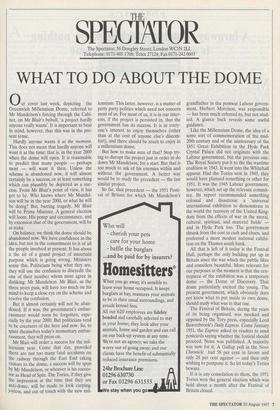SPECTATOR
The Spectator, 56 Doughty Street, London WC1N 2LL Telephone: 0171-405 1706; Telex 27124; Fax 0171-242 0603
WHAT TO DO ABOUT THE DOME
Our cover last week, depicting the Greenwich Millennium Dome, referred to Mr Mandelson's forcing through the Cabi- net, on Mr Blair's behalf, 'a project hardly anyone really wants'. It is important to bear in mind, however, that this was in the pre- sent tense.
Hardly anyone wants it at the moment. This does not mean that hardly anyone will want it at the time; that is, in the year 2000 when the dome will open. It is reasonable to predict that many people — perhaps most — will want it then. Unless the scheme is abandoned now, it will almost certainly be a success, or at least something which can plausibly be depicted as a suc- cess. From Mr Blair's point of view, it has got to be. Who knows where Mr Mandel- son will be in the year 2000, or what he will be doing? But, barring tragedy, Mr Blair will be Prime Minister. A general election will loom. His pomp and circumstance, and by extension that of the government, will be at stake.
On balance, we think the dome should be abandoned now. We have confidence in the idea, but not in the commitment to it of all the people involved at present. It has about it the air of a grand project of uncertain purpose which is going wrong. Ministers sense this. Politicians being what they are, they will use the confusion to discredit the one of their number whom most agree in disliking: Mr Mandelson. Mr Blair, as the three years pass, will have too much on his mind to keep a close eye on the scheme and resolve the confusion.
But it almost certainly will not be aban- doned. If it was, the government's embar- rassment would soon be forgotten, espe- cially by the year 2000. But politicians tend to be creatures of the here and now. So, to spare themselves today's momentary embar- rassment, they will press on.
Mr Blair will order a success for the mil- lennium year. Come that day, provided there are not too many fatal accidents on the railway through the East End taking visitors to the dome, a success will be spun by Mr Mandelson, or whoever is his succes- sor as Head of Spin. The Tories, if they give the impression at the time that they are anti-dome, will be made to look carping, Joyless, and out of touch with the new mil- lennium. This latter, however, is a matter of petty party politics which need not concern most of us. For most of us, it is in our inter- ests, if the project is persisted in, that the government has its success. It is in every- one's interest to enjoy themselves (other than at the cost of anyone else's discom- fort), and there should be much to enjoy in a millennium dome.
But how to make sure of that? Stop try- ing to disrupt the project just in order to do down Mr Mandelson, for a start. But that is too much to ask of his enemies within and without the government. A better way would be to study the precedent — the last similar project.
So far, that precedent — the 1951 Festi- val of Britain for which Mr Mandelson's grandfather in the postwar Labour govern- ment, Herbert Morrison, was responsible — has been much referred to, but not stud- ied. A glance back reveals some useful guidance.
Like the Millennium Dome, the idea of a some sort of commemoration of the mid- 20th century and of the anniversary of the 1851 Great Exhibition in the Hyde Park Crystal Palace did not originate with the Labour government, but the previous one. The Royal Society put it to the the wartime coalition in 1943. It went into the Whitehall apparat. Had the Tories won in 1945, they would have planned something or other for 1951. It was the 1945 Labour government, however, which set up the relevant commit- tee. Its report recommended something colossal and disastrous: a 'universal international exhibition to demonstrate to the world the recovery of the United King- dom from the effects of war in the moral, cultural, spiritual, and material fields' and in Hyde Park too. The government shrank from the cost in cash and chaos, and preferred a more modest national exhibi- tion on the Thames south bank.
All that is left of it today is the Festival Hall, perhaps the only building put up in Britain since the war which the public likes and considers beautiful. More relevant for our purposes at the moment is that the cen- trepiece of the exhibition was a temporary dome — the Dome of Discovery. That dome particularly excited the young. The present government, which obviously does not know what to put inside its own dome, should study what was in that one.
The Festival of Britain, during the years of its being organised, was mocked and opposed by the Tory press, especially Lord Beaverbrook's Daily Express. Come January 1951, the Express asked its readers to send postcards saying whether the festival should proceed. None was published. A majority was now for it. A Gallup poll in the News Chronicle had 58 per cent in favour and only 28 per cent against — and then only wishing to postpone it. So let today's Tories beware.
If it is any consolation to them, the 1951 Tories won the general election which was held about a month after the Festival of Britain closed.


















































 Previous page
Previous page